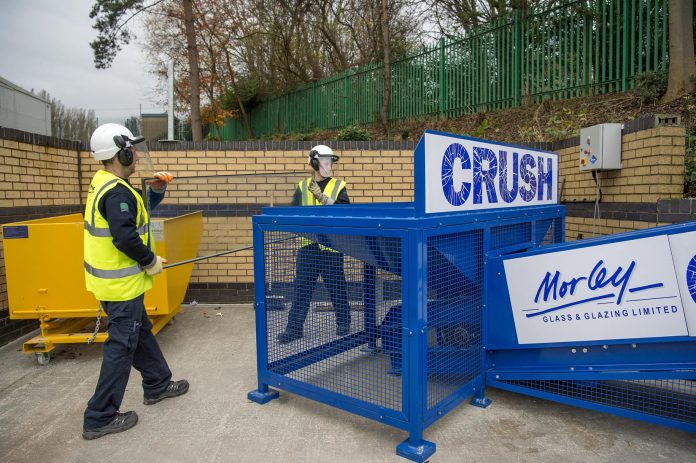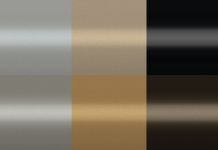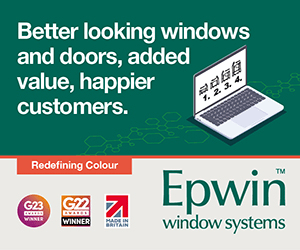Integral blinds manufacturer Morley Glass & Glazing is working in partnership with Saint-Gobain Glass to take recycling to the next level.
The two companies are joining forces to recycle and re-use post-consumer glass; that is glass that has been taken out of old windows that have reached the end of their life.
Saint-Gobain Glass already operates the UK’s largest cullet or waste glass return scheme and, since the introduction of using cullet in the manufacture of float glass, the company has been able to increase the amount of recycled material utilised to 35% rising to 41% in some cases. However, the majority of the 56,000 tonnes of waste glass returned every year comes from the manufacturing process (pre-consumed glass) rather than glass that has been utilised in end products.
Morley Glass & Glazing has now stepped in and offered its 50,000 sq ft manufacturing space in Leeds, West Yorkshire to serve as a collection centre for post-consumer glass and has installed a glass crushing machine and employed one new member of staff to manage the scheme. See the video here of the glass crushing machine in action.
Ian Short, managing director at Morley Glass & Glazing said: “We already send our waste glass from the factory to Saint-Gobain Glass in Eggborough to become cullet and be used in the production of new float glass. Now we are offering our customers the opportunity to return their post-consumer glass to us for recycling free of charge. The money we receive for the recycled glass will be donated to local environmental charities.
“It seems such a waste for our vans to return empty after delivering our sealed units with integral blinds inside throughout the UK, so why not encourage our customers to pack them full of old windows and doors that they are replacing. This saves our customers the cost and inconvenience of disposing of them to landfill or other commercial recycling schemes that will levy a charge for the service. We will then separate the metal and frames from the glass and ensure each element is recycled and re-used as fully as possible.”
Mike Butterick, Head of Marketing at Saint-Gobain Glass said: “This is a fantastic partnership that delivers a sustainable solution for the whole supply chain. Using one tonne of cullet saves 1.2 tonnes of raw material, including 850 kg of sand; reducing CO2 emissions by approximately 300 kg.
“Our innovative use of cullet in the glass manufacturing process has always been a key differentiator for the business and this partnership takes it one step further. It demonstrates Morley Glass & Glazing’s commitment to the environment as they are incurring the additional costs of transporting post-consumer glass from sites across the UK back to their factory in Leeds and sorting and disposing of all component parts of windows and doors. Plus they are donating the proceeds to environmental charities.
“Mirrored, lacquered and coated glass can all be returned and used in the manufacturing process. As cullet takes less energy to process than raw materials, this benefits both Saint-Gobain Glass and the environment.”
Saint-Gobain Glass is committed to ensuring none of the cullet returned ends as landfill. Therefore, if the cullet doesn’t pass the company’s strict screening procedure, provisions are made for it to be recycled elsewhere via a third party.
For more information about Morley Glass & Glazing’s glass recycling scheme visit www.morleyglass.co.uk or visit Morley Glass’s YouTube Channel to see the glass crushing machine in action.












